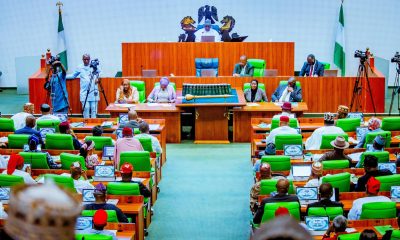Nigeria News
Dangote Refutes Allegations Of Substandard Products At Refinery During Reps Visit

President of the Dangote Group, Aliko Dangote, has firmly denied allegations that the petroleum products from his refinery are of substandard quality.
Naija News reports that Africa’s wealthiest man, Dangote, denied the accusations on Saturday when the House of Representatives leaders toured and examined the refinery located in the Lekki Free Trade Zone, Lagos.
The delegation from the House, led by Reps Speaker Tajudeen Abbas and his deputy Benjamin Kalu, also included Hon Ikenga Ugochinyere.
To substantiate his claim, Dangote and his team conducted tests on diesel bought from two different filling stations as well as diesel produced by his refinery.
According to Channels TV, these tests were carried out in the refinery’s laboratories in the presence of the lawmakers.
The diesel from the other filling stations was purchased while the lawmakers observed, and the sample from the Dangote Refinery was also taken in their presence.
Two types of tests were conducted: a test of the sulphur level and a flash point test. While all crude-based products contain some level of sulphur, high sulphur levels can cause damage to engines and vehicle components. The flash point indicates the lowest temperature at which vapours above the liquid ignite when an ignition source is applied, with the minimum expected flash point being 66 degrees Celsius.
The results indicated that the sulphur content in the diesel from the other stations was alarmingly high, measuring 2,631 ppm and 1,829 ppm, which is much higher than the recommended levels. The flash point tests showed results of 26 and 63 degrees Celsius, both below the recommended minimum of 66 degrees.
In contrast, the diesel from Dangote’s refinery showed significantly better results, with a sulphur content of 87.6 ppm and a flash point of 96 degrees Celsius.
For Dangote, these results demonstrate the superior quality of his refinery’s products and highlight the issue of substandard petroleum products being imported into the country and sold to unsuspecting Nigerians.
Addressing the speaker, Dangote stated, “The most important thing, Your Excellency, is to note that the imported products they are promoting fail the spec tests, but when you check independently, different results may appear.”
He suggested that the only reliable method to determine the quality of imported and sold products is to purchase and test them directly from filling stations.
Speaker Abbas, reflecting on the presentation and the conflicting claims, emphasized the need for further investigation.
“I don’t understand how we have this contradiction between two players representing the public and private sectors.
“I think it is something we need to investigate further to find out if there are ulterior motives,” he remarked.












